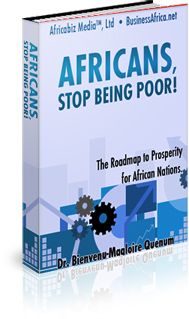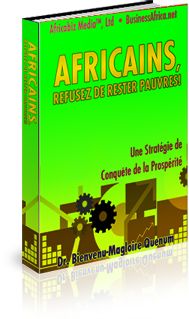|
****JavaScript based drop down DHTML menu generated by NavStudio. (OpenCube Inc. - http://www.opencube.com)****



|
| ! |
| AFRICABIZ
VOL 1 - ISSUE: 45
JANUARY
15 - FEBRUARY 14, 2003
Previous
Issue
Editor: Dr. Bienvenu-Magloire
Quenum
Click here for contact & support console
| | A
WORD FROM THE EDITOR
| | |
|
Dear visitor and international investor,
We
warmly welcome you, if this is
your first visit to Africabiz
Online - The ultimate newsletter
on trading and investing in 49
sub-Saharan African countries.
If you are a regular and faithful
reader, welcome back.
If you are a regular and faithful reader, welcome
back.
-
THERE ARE ALREADY APLENTY OF INITIATIVES TO BOOSTING
AFRICAN ECONOMY
Starting from the independence day of British
colony of Gold Coast (the modern
Ghana), in 1956, innumerable forums and meetings took place and treaties signed
about ways and means to developing Africa and promoting its integration into world's
economy. That is going on since five decades.
African countries themselves
took several initiatives. They established regional economic organizations: ECOWAS,
COMESA, CEMAC.
SADC to name the few and now
NEPAD that is a continental
organization.
Starting from 1963, African countries and the European
Union signed several Cooperation Agreements: (Yaoudé I - 1963, Yaoundé
II - 1975, Lomé I - 1975, Lomé II - 1979, Lomé III - 1984,
Lomé IV - 1990, Lomé -IV Revised - 1995, Cotonou - 2000). Click
here to review the evolution of the membership to these different Agreements..
On January 13 to 17, 2003, hundred of officials from 33 African countries'
governments attended a ministerial gathering, at Mauritius'
capital city, Port Louis, to discuss the second African
Gro wth and Opportunities Act - AGOA between the United States of America
and Africa.
During the same period, together with the AGOA's meeting,
the Private Sector Forum is held at the city of the Pointe-auxPiments,
Mauritius, attended by 500 business leaders from USA and from around the African
continent.
Both meetings' finality, together with a NGOs' meeting -
January 13-15, 2003, is to discuss about ways and means to boost trade between
the US and the continent.
There are also the permanent initiatives implemented
over years by the United Nations' specialized organizations such as the United
Nations Development Program / UNDP,
the World Trade Organization / WTO,
International Trade Centre / ITC
- not to forget the famous Structural Adjustment Programs / SAP
initiated by the IMF and the World Bank.
-
AFRICA REPRESENTS ONLY 1-2% OF WORLD GLOBAL TRADE
One can
see - in view of above listed forums, treaties and meetings - that there are plenty
of initiatives since 50 years to boosting the African economy and bridging the
developing gap.
However,
in spite of all these good initiatives, the African continent represents, at the
beginning of the 21rst century, a mere 1 to 2% of the world trade. South Africa
alone accounting for 40 per cent of said share.
One is therefore entitled
to ask the following questions:
-
Why all these "remarkable" initiatives yielded so a meager result?
-
Why the continent remains in the backyard of economic development?
- Why
even the African countries performing well had not succeeded in alleviating rampant
poverty and high unemployment?
- Even South
Africa that is seen as an African "superpower" does not stand
out of the crowd as far as wealth distribution and fight against poverty areconcerned.
- The only brilliant exception is Mauritius |
Why is it so? How comes that Ghana that had the same per capita GNP (US$ 300)
as Japan, Malaysia and Spain in 1955 (one year before the independence) is now
trailing far behind? For answers click
here to read about: "Before Trade Comes Production Of Goods And Services
At Competitive Prices"
-
Contributor's Guidelines are here
for review. Your contribution on "How African countries / entrepreneurs
could bridge the developing gap" is welcome.
Many thanks for dropping by and see you here on February
15, 2003
Dr. B.M. Quenum
Editor
of AFRICABIZ

| | | |
BUSINESS
OPPORTUNITIES IN AFRICA
| |
- Several
business opportunities with high profit making potential, which are economic
catalysts and components to the Strategy for African Countries - here
available, have been introduced to you. They are listed in following table.
| a-
SHEA BUTTER (Issues 5, 6,
7, 11,
12, 13)
b- BLUE GOLD (Issues 14,
15, 16,
17, 18,
19)
c- FREEZE-DRIED
PAPAIN (Issues 20, 21,
22 and here)
d- KENAF (Issues 23,
24)
e- VEGETABLE OIL
(Issues 25, 26,
27 and 28)
f- CEREALS (Issues 30,
31, 32,
33)
g- FRUITS (34,
35, 36,
37, 38,
39, 40,
42, 43,
44) |
-
TROPICAL FRUITS INDUSTRY AS INCOME BUILDING POWER FOR AN
AFRICAN COMMUNITY: PART
XI : PRODUCTION COST OF FOOD ENZYME / NATURAL NUTRIMENT / BROMELAIN / A COMPETITOR
OF PAPAIN
Pineapple fruit is an extraordinary concentrate of several chemical components
necessary to a healthy human and animal life as shown by the composition here
exposed.
Currently, pineapple cultivated in African countries is exported
as fresh or canned fruit, or locally processed into juice concentrates and syrup
for the local and export market. Pineapple bran, the cake / residue obtained
after extracting the juice, has a high content of vitamin A: it is an excellent
feed for livestock.
The most interesting processed product from pineapple,
however, is a food enzyme called Bromelain or Bromelin, which is a competitor
to papain.
Bromelain is a mixture of sulfur-containing protein-digesting
enzymes (proteases) from the stem of the pineapple plant. Bromelain has been shown
to be effective in the reduction of inflammation and helpful in the reduction
of swelling.
-
PRODUCTION OF BROMELAIN
Bromelain
was formerly produced from pineapple juice (20,87 kg of fresh stern juice to producing
450 grams of Bromelain).
Now commercial bromelain is either industrially
processed from dehydrated "Bran": the waste from the pineapple fruit juice processing
factories, or from the mature plant stems
/ stumps salvaged when fields are being cleared at the end of plantation cycle.
The yield from 167 kg of stems' stern juice is 3.6 kg of bromelain - Source
-
INVESTMENT ESTIMATE TO PRODUCING 50 METRIC TONS OF BROMELAIN
PER YEAR:
In table below are listed investment items and estimate
to producing 50 MT of Bromelain per year, from 2,320 metric tons of pineapple
stems.
| | Amount
(US$ x 1,000) | |
INVESTMENT
| | 1-
Buildings: Plant (1,000 sq. meter) - Offices (150 sq.
meter) - Housing for management staff (3 x 100 sq. meter) |
350
| |
2- Processing Equipment: Know How acquisition - Equipment
purchase and setup - Blank Startup Assistance - Spare Parts - Storage tanks /
Areas. Etc. |
675
| | 3-
Other Equipment: Offices equipment - Two trucks - Three
four wheelers - Housing furniture. Etc. | 150 |
| 4-
Starting expenses: Feasibility study / Business Plan
for the processing plant - Startup technical assistance (for six months) Etc.
| 120
| | Total
investment | 1,295 |
| PRODUCTION
LEVEL | | 1-
Crude Bromelain = 50 metric tons at full capacity.
| | OPERATING
COSTS | |
Operational
Expenses: Raw material
(around 2,320 metric tons of pineapple stems) harvesting, handling and transport
to plant floor - production costs - insurance - utilities - staff and hands /
management salaries - external management assistance - amortization - interests
on loan - merchandise packaging. Etc.
| 975 |
| Cost
of production off Plant Floor of One Metric Ton of Crude Bromelain | 19,5 |
Above
Table gives an estimate - in African operational conditions - for the production
cost of one metric ton of crude bromelain i.e. US$ 19,500 or US$ 19.5 per kg.
-
BROMELAIN APPLICATIONS:
Bromelain
is nowadays used for medical treatment for the following health problems - Source:
- Atherosclerosis
- Cancer
- Dysmenorhea Infection
- Inflammation
- Osteoarthritis
- Peripheral Vascular Disease
- Rheumatoid Arthritis
- Scleroderma
- Sports Injuries
- Wound Healing |
Indeed, bromelain has a very large specter of usage in biochemistry, pharmacology
and miscellaneous illness treatments because it contains, among other components,
various closely related proteinases. Click
here for more.
 -
In view of above listed usage of Bromelain, and the
outstanding
chemical components present in pineapple fruit itself, African countries
should devote more Research & Development to Pineapple fruit in order to creating
pharmaceutical / phytomedicinal industries / food enzymes for local and export
market. -
In view of above listed usage of Bromelain, and the
outstanding
chemical components present in pineapple fruit itself, African countries
should devote more Research & Development to Pineapple fruit in order to creating
pharmaceutical / phytomedicinal industries / food enzymes for local and export
market.
Papain is a significant export item for Tanzania,
Uganda, RDC
and South Africa. However,
imports from African countries accounted for under 1% of total imports of enzymes
to the US as shown on table
about US imports.
Obviously there is - with the production of Papain
or Bromelain - an opportunity for African countries to entering the market of
food enzymes and grabbing a biggest share because, owing to the pricing
of papain / bromelain on the international marketplace, producing and exporting
- even small quantities - should be a profitable line of business for African
entrepreneurs.
Next issue 46
shall deal with the huge existing potential market in Africa for Nutriments and
Supplements based on Papain and Bromelain.
- Interested parties - private African and international investors /
companies, government
agencies,
international development
agencies - to make contact through the Free Access Support Console available at this link
Contact through the support console will get quickest reply from Africabiz Online's staff, than contact by emails. Click here for contact information. Be advised that first contact should be through the support console to be followed by phone calls. If you are a VIP-Member, use VIP-Members Support Console available here.
Before you consult please click
here to review this clarification
| |

